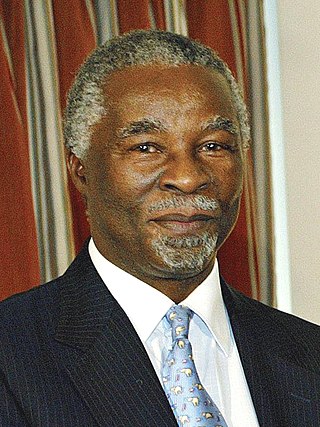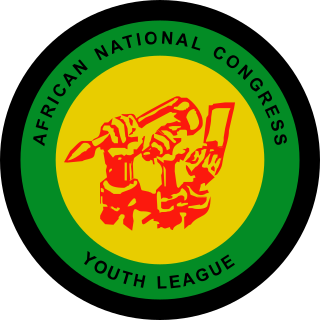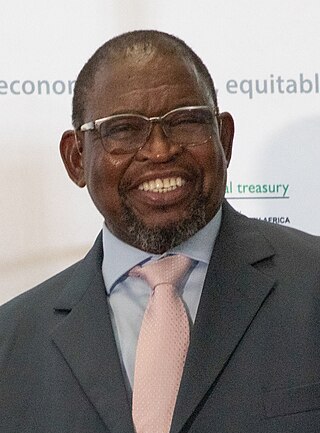
Thabo Mvuyelwa Mbeki is a South African politician who served as the second president of South Africa from 14 June 1999 to 24 September 2008, when he resigned at the request of his party, the African National Congress (ANC). Before that, he was deputy president under Nelson Mandela from 1994 to 1999.

Nkosazana Clarice Dlamini-Zuma, sometimes referred to by her initials NDZ, is a South African politician, medical doctor and former anti-apartheid activist. A longstanding member of the African National Congress (ANC), she currently serves as Minister in the Presidency responsible for Women, Youth and Persons with Disabilities and is the Chancellor of the University of Limpopo.

Baleka Mbete is a South African politician who was the Deputy President of South Africa from September 2008 to May 2009. She was also the Speaker of the National Assembly for two non-consecutive terms from 2004 to 2008 and from 2014 to 2019. A member of the African National Congress (ANC), she was first elected to the National Assembly in 1994 and stepped down from her seat in 2019.

The African National Congress Youth League (ANCYL) is the youth wing of the African National Congress (ANC). As set out in its constitution, the ANC Youth League is led by a National Executive Committee (NEC) and a National Working Committee (NWC).

Angela Thokozile Didiza is a South African politician who is currently serving as Minister of Agriculture, Land Reform and Rural Development since May 2019. A member of the African National Congress (ANC), she was the Minister of Agriculture and Land Affairs from June 1999 to May 2006 and Minister of Public Works from May 2006 to September 2008.

Nosiviwe Noluthando Mapisa-Nqakula is a South African politician who served as the Speaker of the National Assembly from August 2021 until her resignation on 3 April 2024. She was a cabinet minister from 2004 to 2021, including as Minister of Defence and Military Veterans between June 2012 and August 2021. She was an elected member of the National Executive Committee of the African National Congress (ANC) between 2002 and 2022 and is a former president of the ANC Women's League.
Makhenkesi Arnold Stofile was a South African politician and anti-apartheid activist who served as the second Premier of the Eastern Cape from 1997 to 2004. After that, he was Minister of Sport and Recreation from 2004 to 2010. He was also a member of the National Executive Committee of the African National Congress (ANC).
The 52nd National Conference of the African National Congress (ANC) was held in Polokwane, Limpopo, from 16 to 20 December 2007. At the conference, Jacob Zuma and his supporters were elected to the party's top leadership and National Executive Committee (NEC), dealing a significant defeat to national President Thabo Mbeki, who had sought a third term in the ANC presidency. The conference was a precursor to the general election of 2009, which the ANC was extremely likely to win and which did indeed lead to Zuma's ascension to the presidency of South Africa. Mbeki was prohibited from serving a third term as national President but, if re-elected ANC President, could likely have leveraged that office to select his successor.
The National Executive Committee (NEC) of the African National Congress (ANC) is the party's chief executive organ. It is elected every five years at the party’s national conference; the executive committee, in turn, elects a National Working Committee for day-to-day decision-making responsibilities. At the NEC's head is the president of the ANC, and it also contains the other so-called "Top Seven" leaders : the deputy president, chairperson, secretary-general, two deputy secretaries-general and treasurer-general.
The 51st National Conference of the African National Congress (ANC) was held at the University of Stellenbosch in Stellenbosch, Western Cape, from 16 to 20 December 2002, during the ANC's 90th anniversary. President Thabo Mbeki was re-elected to the party presidency and, notably, there was no change in other five top leadership positions except for Deputy Secretary General. There was also little competition for other spots on the National Executive Committee (NEC). This ANC conference has thus been called "the quietest in its history."

The African National Congress (ANC) has been the governing party of the Republic of South Africa since 1994. The ANC was founded on 8 January 1912 in Bloemfontein and is the oldest liberation movement in Africa.
The 53rd National Conference of the African National Congress (ANC) was held in Mangaung, Free State from 16 to 20 December 2012, during the centenary of the ANC's establishment, also in Mangaung. It re-elected incumbent President Jacob Zuma and his supporters to the party's top leadership and National Executive Committee (NEC), solidly defeating an opposing group that had coalesced around presidential challenger Deputy President Kgalema Motlanthe.

Thandi Ruth Modise is a South African politician who is currently serving as the Minister of Defence and Military Veterans. She was previously the Premier of the North West from 2010 to 2014, Chairperson of the National Council of Provinces from 2014 to 2019, and Speaker of the National Assembly from 2019 to 2021.
The 50th National Conference of the African National Congress (ANC) took place from 16 to 20 December 1997 at the University of the North West in what was then called Mafikeng. Attended by 3,000 voting delegates, the conference elected a successor to outgoing ANC President Nelson Mandela, who declined to stand for another term. Thabo Mbeki was elected unopposed, and Jacob Zuma was elected unopposed as his deputy; they were later elected President and Deputy President of the country in the 1999 general elections, in which the ANC won 66.35% of the vote, up from 62.65% in 1994.
Godfrey Phumulo Masualle is a South African politician from the Eastern Cape who has represented the African National Congress (ANC) in the National Assembly since May 2019. He was Deputy Minister of Public Enterprises from May 2019 to March 2023, and before that he was the sixth Premier of the Eastern Cape from May 2014 to May 2019.
The 54th National Conference of the African National Congress (ANC) took place from 16 to 20 December 2017 at the Johannesburg Expo Centre in Nasrec, Gauteng. At the conference, the ANC elected its National Executive Committee (NEC) and other top internal leaders. Often referred to as the Nasrec Conference, it was held during the centenary of the birth of former ANC President Oliver Tambo and was convened under the theme, "Remember Tambo: Towards Unity, Renewal and Radical Socioeconomic Transformation."

Enoch Godongwana is a South African politician and former trade unionist who is currently serving as the Minister of Finance since August 2021. He is a member of the National Executive Committee of the African National Congress (ANC).
The 48th National Conference of the African National Congress (ANC) took place from 2 to 7 July 1991 at the University of Durban–Westville in Durban, KwaZulu-Natal. It was the first national conference of the ANC since the organisation was banned by the apartheid government in 1960 and marked the ascension of Nelson Mandela to the ANC presidency, which since 1967 had been held by Oliver Tambo.
The Provincial Executive Committees (PECs) of the African National Congress (ANC) are the chief executive organs of the party's nine provincial branches. Comprising the so-called “Top Five” provincial officials and up to 30 additional elected members, each is structured similarly to the party's National Executive Committee (NEC) and is elected every four years at party provincial conferences.
Fébé Potgieter-Gqubule is a politician from Eastern Cape, South Africa. She has held various positions in public entities and in her political party, the African National Congress (ANC).









